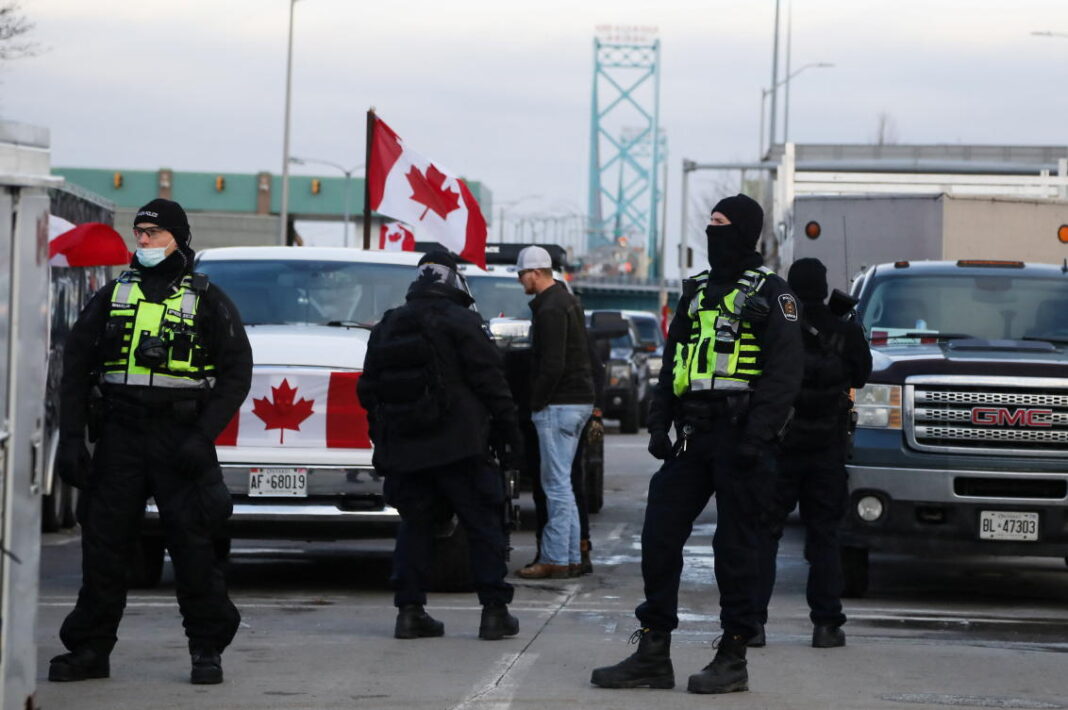WINDSOR, Ontario: Protesters at the busiest border crossing between the United States and Canada remained Saturday despite new warnings to end the blockade.
The blockade has disrupted the flow of goods between the two countries and forced the auto industry on both sides to roll back production.
It was not immediately clear when or if law enforcement officers would be sent in to remove the demonstrators, who are protesting against Canada’s COVID-19 mandates and restrictions. There is also outpouring of fury toward Prime Minister Justin Trudeau.
About 20 protesters milled about outside early Saturday, while others remained in their pickup trucks and other cars. A judge on Friday ordered protesters at the Ambassador Bridge over the US-Canadian border to end the blockade that has now entered a sixth day.
On Friday, Ontario Premier Doug Ford declared a state of emergency in the province that will allow his cabinet to impose $100,000 fines and up to one year in jail as punishments against people who continue to illegally block roads, bridges, walkways and other critical infrastructure.
Chief Justice Geoffrey Morawetz of the Ontario Superior Court issued an injunction giving protesters blocking cross-border traffic until 7 p.m. Friday to clear out. However, the deadline came and went.
Windsor police immediately warned that anyone blocking the streets could be subject to arrest and their vehicles could be seized.
The news was met with defiance by protesters.
At the Ambassador Bridge, an unidentified person grabbed a microphone and addressed the crowd, asking if they wanted to stay or leave when the deadline rolled around. By a show of applause, it was agreed they would stay. “OK,” the man said. “Let’s stand tall.” The protesters responded by singing the Canadian national anthem.
The crowd later grew in size and intensity, with flag-waving and frequent chants of “Freedom!” More patrol cars moved in around the site, and police handed out leaflets warning that a state of emergency would come into effect at midnight.
Since Monday, drivers mostly in pickup trucks have bottled up the bridge connecting Windsor to Detroit. Hundreds more truckers have paralyzed downtown Ottawa over the past two weeks; it was a party atmosphere there Friday night, when they even set up a concert stage.
Protesters have also blocked two other border crossings, in Alberta and Manitoba.
The Ambassador Bridge is the busiest US-Canadian border crossing, carrying 25 percent of all trade between the two countries. The standoff comes at a time when the auto industry is already struggling to maintain production in the face of pandemic-induced shortages of computer chips and other supply-chain disruptions.
Ford said he would convene the provincial cabinet on Saturday to urgently enact measures that make it “crystal clear” it is illegal to block critical infrastructure. The measures will also provide additional authority “to consider taking away the personal and commercial licenses of anyone who doesn’t comply,” Ford said.
Trudeau called Ontario’s decision “responsible and necessary” and said he spoke with US President Joe Biden about it. He said he and Biden agreed that “for the security of people and the economy, these blockades can’t continue.”
Trudeau said he understands the protesters are frustrated by the pandemic, but “these blockades are hurting everyday families, auto assembly workers, farmers, truckers, blue-collar Canadians.”
The protests have caused shortages of auto parts that have forced General Motors, Ford, Toyota and Honda to close plants or cancel shifts.
While the Canadian protesters are decrying vaccine mandates for truckers and other COVID-19 restrictions, many of the country’s infection measures, such as mask rules and vaccine passports for getting into restaurants and theaters are already falling away as the omicron surge levels off.
Pandemic restrictions have been far stricter in Canada than in the US, but Canadians have largely supported them. The vast majority of Canadians are vaccinated, and the COVID-19 death rate is one-third that of the United States.
Defiant protesters remain at key US Canada border crossing




